


Trying to earn my admission as a transfer to the University of Southern California for fall 2015, I prioritized my GPA before everything, including my learning experience. Instead of deeply absorbing and reflecting the course materials throughout my learning process, I cared only for my letter grades and the plus and minus signs that sit behind them by blandly completing my assignments and memorizing information that I will soon forget. As a result, throughout fall and winter quarter, although I got the letter grades I worked for, I felt like I learned nothing at all. But by taking Writing 39C, my perspective on learning completely changed as I developed myself into a passionate writer and learner.
Before I took this course, rumors regarding the difficulty and time-consuming nature of this course have already clouded my mindset and attitude. I did not look forward to taking this course and wanted to get it over with as fast as I could. Also, writing has always been my weakest subject, since English is my second language as I moved here from China in fifth grade to continue my education, which was mentioned in my earlier self-assessment and below presents an excerpt extracted from it.

Unfortunately, my first writing experience in college with Writing 39B was not a pleasant one; I had no passion in analyzing “authors’ purposes” on fiction stories that had nothing to do with reality and practical personal ideals. I thought if I can barely make it through 39B, 39C was going to be very unbearable and torturing. The diction “research” in the course name of Writing 39C, Argument and Research, intimidated me as I could think of nothing but long, analytical, and single-spaced papers, which was true for this case, except for the “single-spaced” part. Yet, from choosing a specific topic of research to completing the final draft of my advocacy project, my attitude and perspective on not only this course but also my whole writing career shifted 180 degrees.
The theme of this course, Global Woman, took the initial step of sparking my passion in researching. Prior to taking this course, I was very passionate in anti-human trafficking awareness due to human trafficking's malicious nature and tremendous impact on our society today. I would always watch documentaries and research news about it on my free time. The anger and frustration I have due to the enormous number of victims and lack of enforcement towards this issue greatly added to my passion in researching and arguing for the lack of awareness and solutions to this problem. I took great pleasure and interest in the researching part of my Historical Conversations and Advocacy Project, however, I faced many difficulties in the composing, researching, and revision process throughout this course. Yet, through these obstacles, I developed myself as a better writer by reflecting my values and passion toward my topic with the quality, credibility and persuasiveness of my arguments. I am glad to say that my passion towards this subject has overcome my narrow perspective of “only letter grades matter” not only in this course but for the rest of my future learning experience. I realized knowledge is power, not only to reflect my own perspectives but also to change society’s through my individual believes and ability. I also realized that learning is a process; not only does it take effort and time, but also perseverance and patience as well as mistakes are inevitable but ultimately serve as the stepping-stone to better solutions. Deleting hours and pages worth of research due to changing topics and ideas often left me discouraged, but slowly I realized that even though I may not end up using this information in my arguments, I learned something new and interesting. Each process of this course, including the composing, researching, and revision processes, has reflected a part of my learning as a better writer, researcher, and arguer.
The composing process was personally the most difficult part of this course as I struggled with the overall organization and deciding the final topic I wish to focus on. For my historical conversation project, I took precautions as my professor repeatedly addressed that the topic I chose to work on might not end up being the one I fully commit to. In my initial research proposal discussion post, with an excerpt shown below, I first chose to go with the topic “How Sexism Affect Sex Trafficking in the United States” and was very adamant that this topic would be easy and resource-abundant to write about. 
I was inspired to focus on this topic by the short essay “Love and Gold” that we read in our class text, Global Woman, written by Barbara Ehrenreich and Arlie Russell Hochschild. As shown in the excerpt from my research proposal discussion post below, it reflected explanation for why women are the main target of manipulation and exploitation and led to my conclusion of targeting women rights and equality for the main reason of sex trafficking.

However, as I started the researching process for my Historical Conversation Project, I found very little research backing up my argument and that sexism is actually not the main reason of sex trafficking in the United States. As a result, I decided to change my topic towards how globalization affects human trafficking in the United States as it was mentioned several times when I researched for my previous topic.
As I started researching my new topic, I was very content to find pages of research when I typed in my key words “globalization” and “human trafficking” in UCI Library’s Academic Search Complete. Reading through the articles, I extracted large amounts of informative evidence and was ready to organize them to back up my argument. However, the research seemed to go on and on, and the more I researched, the more specific it got, until I realized it was impossible to fit everything within the 8-page restriction of my HCP. In the back of my head, I realized this topic was ultimately too broad and I technically needed to restart my paper from scratch on a new topic, but that was after nearly six hours of researching which made it very hard to delete the many pages of information my starting draft already had. Below presents the structure I first planned to follow.

Not knowing what to do next, I decided to visit office hours where my professor told me that my topic was indeed very broad and that I will need to stay as specific as possible. I was disappointed at first, as my past essays drafts were always consisted of editing compared to researching, where changing and restarting topics are necessary in forming the final topic. As a result, I had to delete most of the contents in my starting draft and restart my research process.I would say that forming the mentality of accepting huge changes and deletions of work that required hours of dedication was the hardest part of my composing process, but it was also one of the most valuable experiences I learned as a writer, realizing that a good final draft will always require long process of drafting. Most importantly, I realized that none of the wasted drafts are ever “wasted” as I gained extra knowledge that may not be applicable in my papers, but for myself to learn and reflect on.
As I did more research, I finally decided to focus on the legal aspect of human trafficking in the United States, which directly targets the country’s ineffectiveness of battling human trafficking and why it is still a prominent issue in our society today. This topic was very resource abundant and as a result, the overall organization of my HCP was quite overwhelming at first. My first draft was very disorganized as I did a very bad job focusing specifically on the legal aspect of human trafficking. Instead of addressing the ineffectiveness of the anti-human trafficking laws in the U.S., I spent the majority of my paper talking about the impact of sex trafficking and briefly talked about the ineffectiveness of the anti-human trafficking laws. Ultimately, my paper topic was still too broad. As I got my feedback for my first draft, which is shown below, my professor suggested that it was necessary for me to narrow down to a specific problem in the sex-trafficking industry and tackle specific components of the laws that resulted in inefficiency.

As a result, I did more research on anti-human trafficking laws and realized researching the “legal aspect” of human trafficking is still too broad as there are numerous acts, polices and laws that has been implemented to combat human trafficking.
As I continued my research process and began composing my second draft, I focused on examining specific laws and their flaws of combating human trafficking. Yet, in the middle of my process, I realized many of the sources I researched specifically targeted the Trafficking Victims Protection Act of 2000 (TVPA 2000) the most as it was one of the most important human trafficking law passed but also the most flawed. This was one of the times my light bulb illuminated as I finally narrowed down my broad topic to a very specific law to target. Not only does this law explain the majority inefficiency of our legal system, but also serves as a representative for almost all other human trafficking laws due to similar flaws. As a result, I focused on explaining what TVPA 2000 is and breaking down specific parts of its flaws. My second draft was definitely much more organized and specific than my first draft, as I got encouraging feedbacks from my professor shown below.
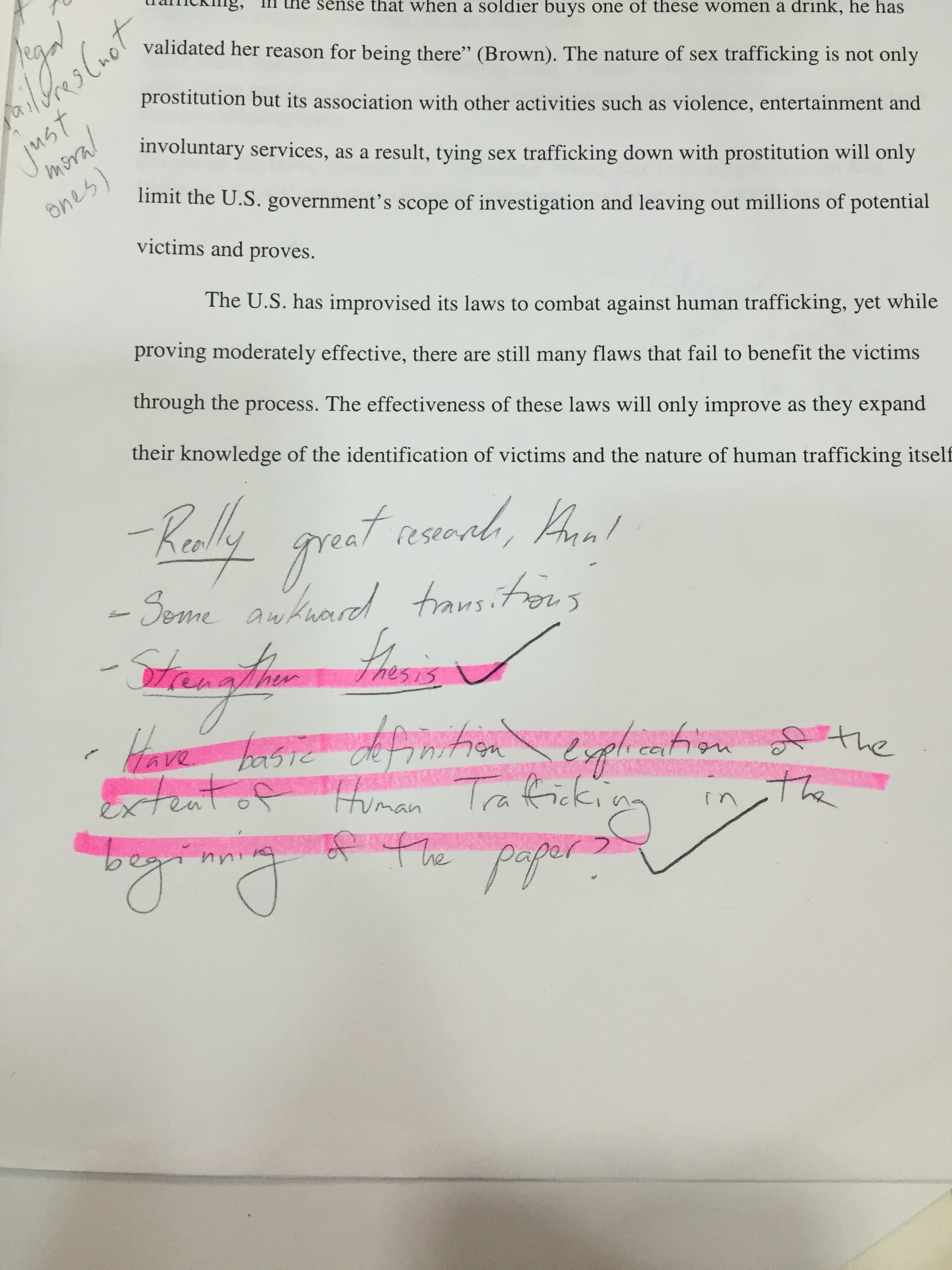
The changes I was suggested to make were to strengthen my thesis, fix awkward transitions, and provide a basic definition and explaining what human trafficking is in the beginning, which is shown below with a comparison of the second and final draft.

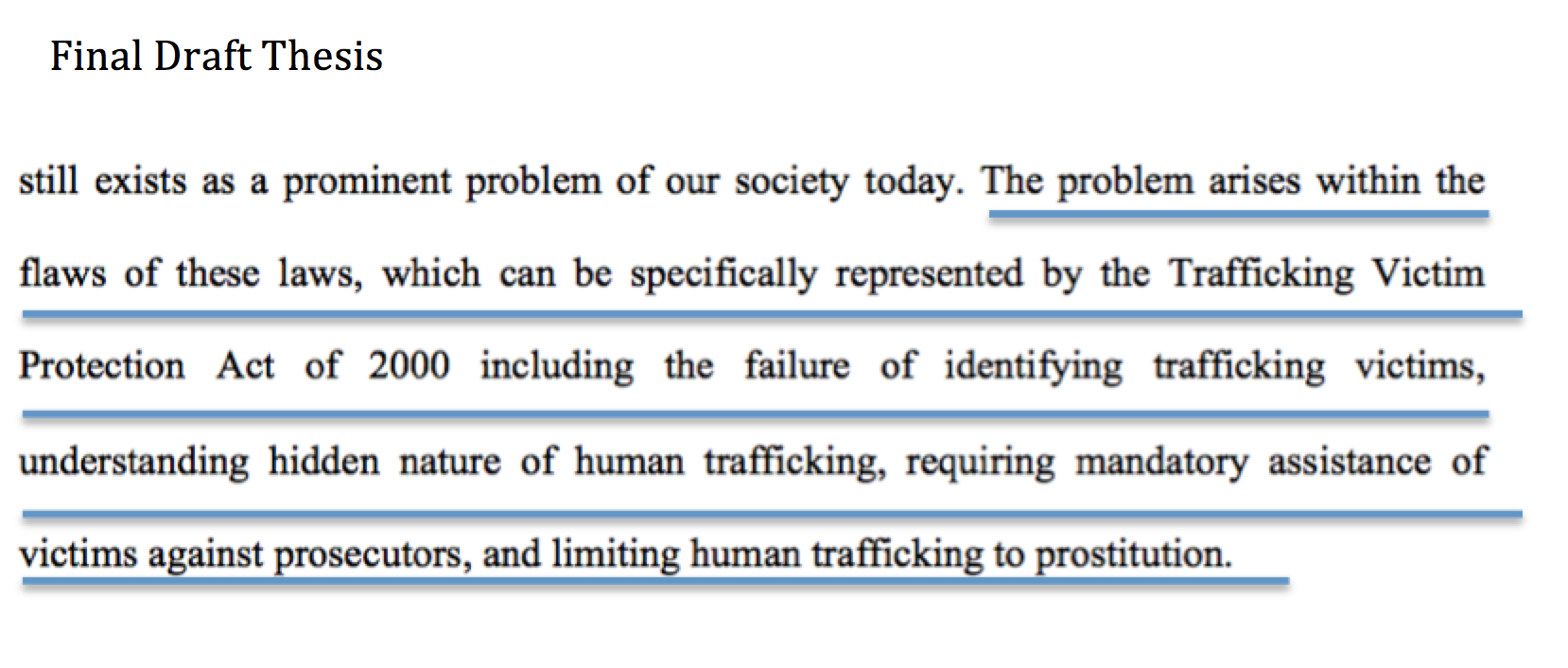
I continued to research more specifically focusing on TVPA 2000 for my final draft and absolutely loved the process. I realized researching is a never ending process, and that the more you research, the more knowledge you obtain on your topics.
As suggested by my peer review comments shown below, I mainly focused on adding more sources to backup my arguments and provide more information as I mainly relied majorly on two main sources for my second drafts, which is also shown below.
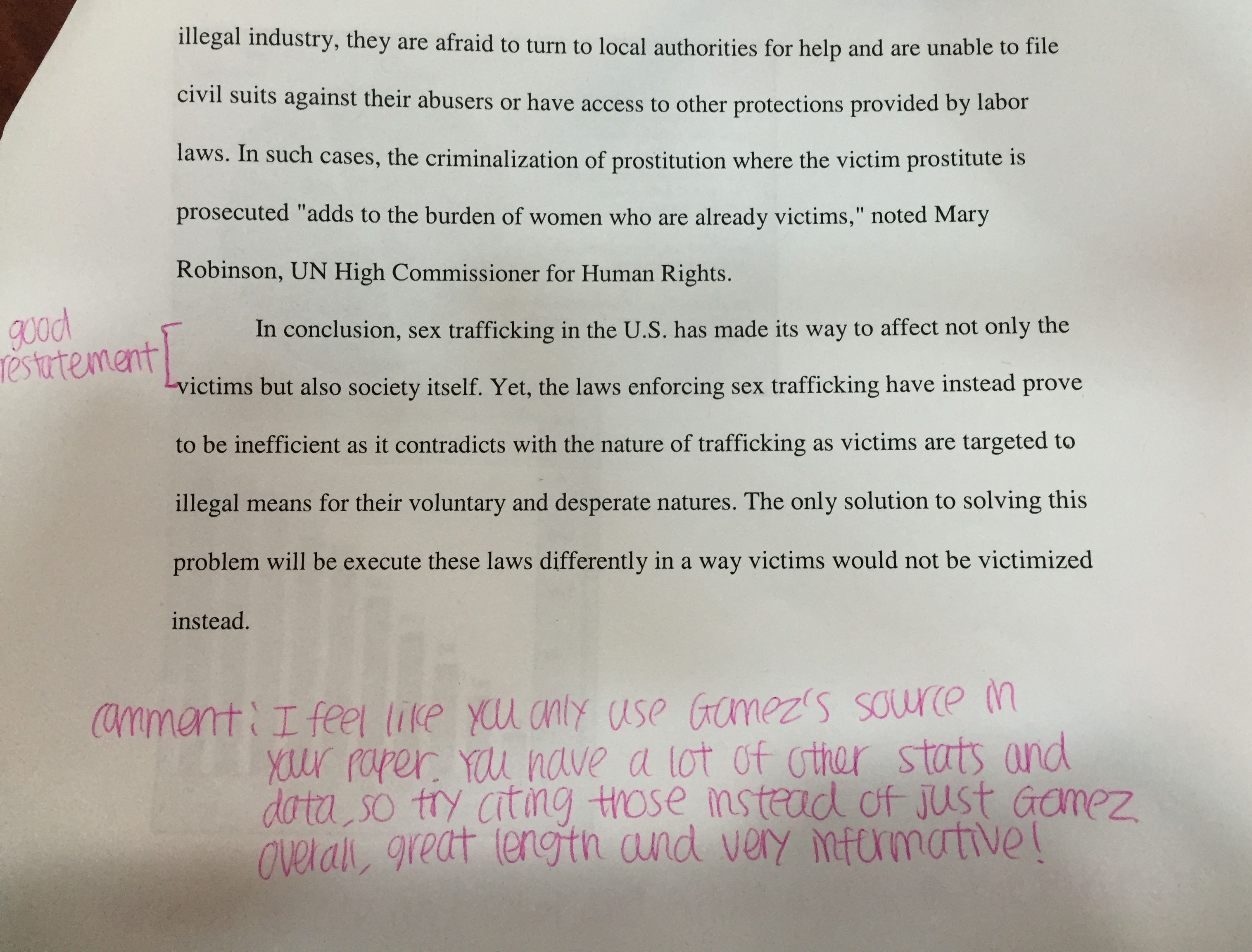

Since both sources are law reviews, I added sources such as scholarly journals, non-profit organizations, and Department of State documents to enforce the “mutli-modal” aspect of the HCP. Choosing the sources were not that difficult except for the fact that I was used to citing from Wikipedia all my life until now. Yet, since my topic is quite resource abundant, I stumbled upon very informative sources that I evaluated in my Source Evaluation Page.
Providing multi-modal sources was challenging at first, as I was confused about what information should be presented with graphs/images and which should be presented through texts. Yet, as I researched more, I realized it is more convenient to use texts to express very specific details such as statistics that can be concluded in short and condensed sentences shown in figure 1 below and to use graphs and images to express sources that are too broad and complicated, such as figure 2 and 3 shown below, to be expressed in simple sentences.

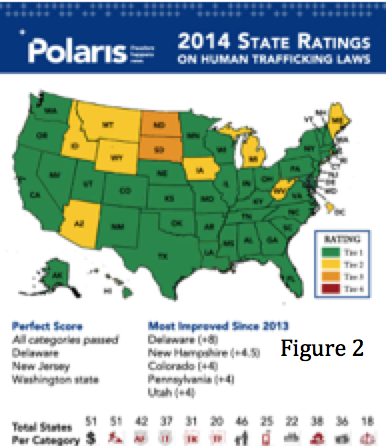

As the abundance of my sources increased, it was very overwhelming organizing my paper at first. Yet, as I organized my information into different groups, I realized the best way to break down my argument is by using the inverse pizza structure shown below.
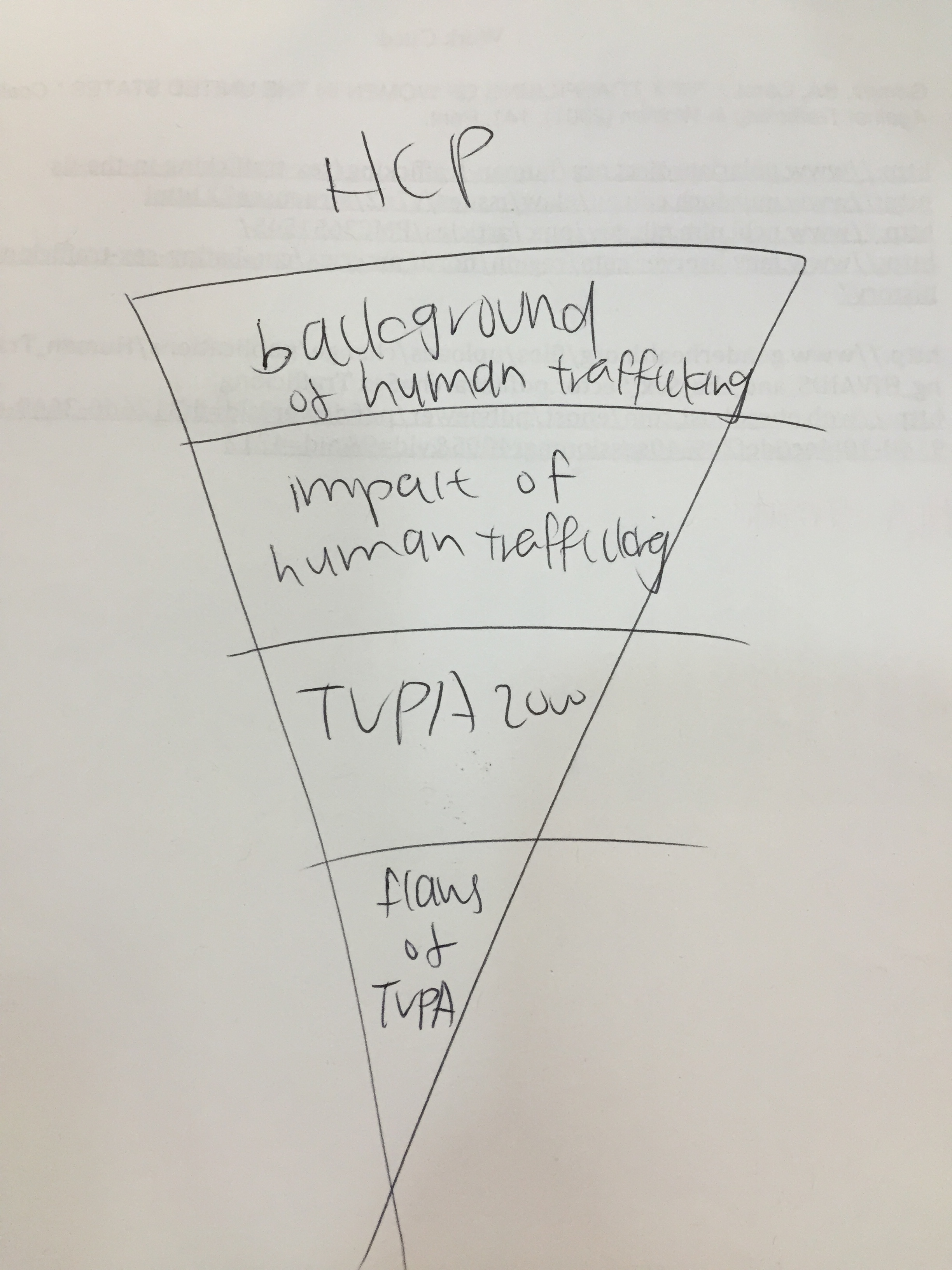
I started my final draft by introducing the broad background of human trafficking, explaining why it is a prominent issue that needs awareness in our society, clarifying why the ineffectiveness of the Trafficking Victims Protection Act of 2000 (anti-human trafficking law) contributes to this problem, and focusing on the specific details of the flaws of the TVPA. With this structure, it was very easy to follow and understand the specific arguments of my paper with sufficient background information and knowledge. My final draft was very successful as I got 98/100 for my score shown below, I was very content realizing all the time and dedication I put into the composition and revision processes were all paid off at the end.
Now, onto the Advocacy Project. The composition of my advocacy project had similar level of difficulty as my HCP drafts as I also struggled with what specific methods and solutions I should focus on. Since human trafficking is a very prominent issue of our society, the amount of potential methods and solutions that combats against it is abundant as well. While writing my HCP, many sources I used provided solutions in their documents, such as the Creighton Law Review and the McGeorge Law Review shown below in my ADP Prospectus, which greatly assisted me in choosing what I should focus on for my advocacy project.


The majority of them tend to focus on the education of the public and law enforcement officers, as raising awareness of the invisibility of the crime is very important. Also, one of my peer review on my ADP prospectus suggested that not only should I focus on the education and training part, but only add existing non-profit organizations to back up my argument, shown below.

As a result, I proposed, shown below in my Advocacy Essay Madlibs, to focus on the education of general public and law enforcement officers through the implementations of existing non-profit organizations and trainings.
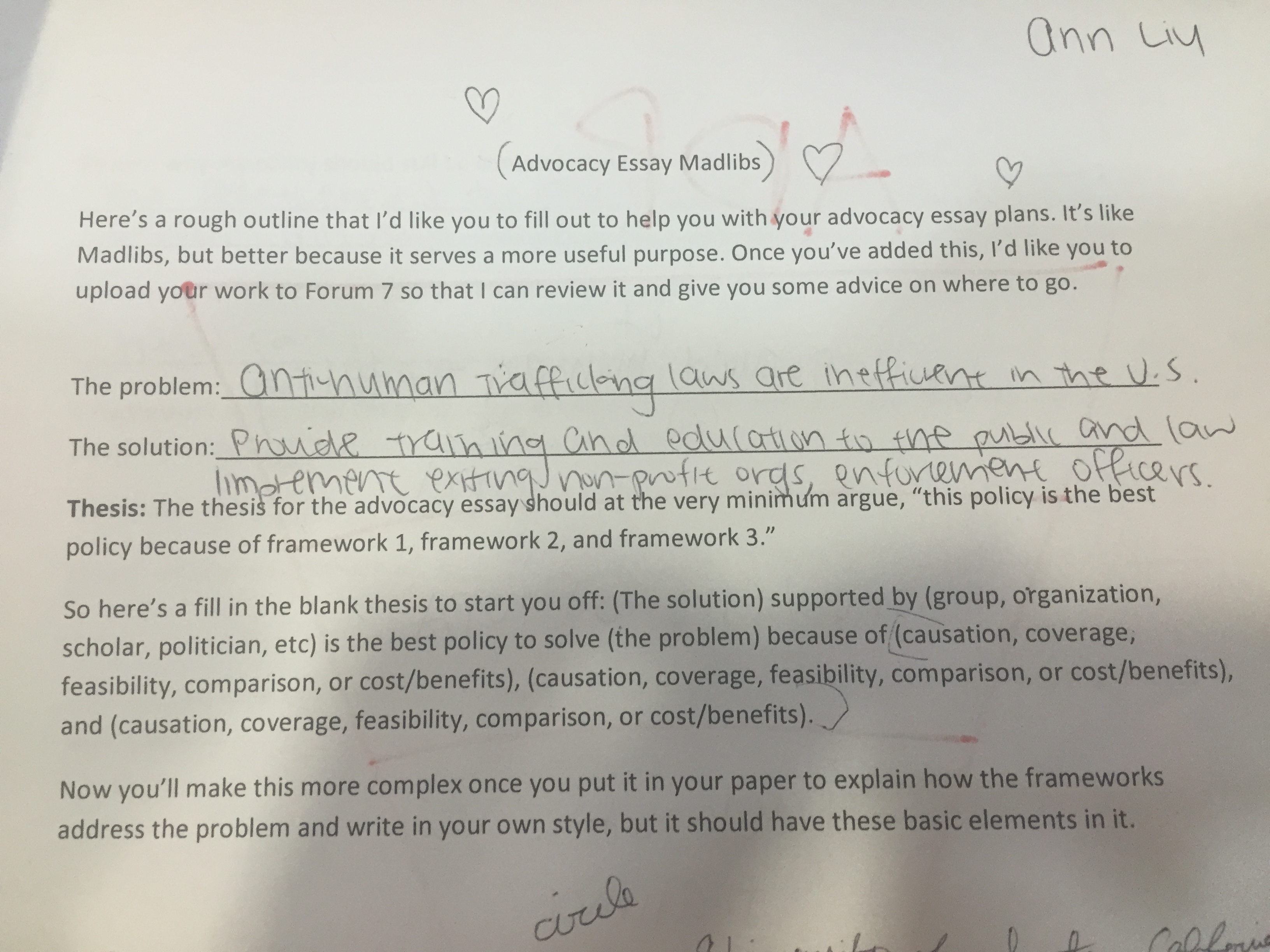
Composing my ADP was very confusing at first as I struggled with two questions, as I was not sure if I was supposed to propose new solutions or just to advocate for solutions that already exist. If I were to propose a new solution, I did not know what I could possible cite to support a solution that does not even exist yet. And if I were to advocate for solution that already exist, am I not just repeating and copying other advocators’ ideas? Also, I did not know the ideal ratio of problem to solution I should apply. It was very uncomfortable in my first draft repeating a lot of sources I stated in my HCP. As a result, my first draft was a mess as I wrote seven pages regarding the problem of the lack of training law enforcement officers have and completely ignored the advocacy part, basically rewriting another HCP. To seek advice and suggestions for this confusion, I went to office hours and expressed my problem and was told that I am to propose solutions and use existing solutions to backup mine but at the same time address what can still be improved. The feedback for my first draft, shown below, was very helpful as I was suggested that the repetition of my HCP is fine and that I should write as much as I need to provide a general knowledge of the background and problem for my readers to understand the scope and necessity of my issue.
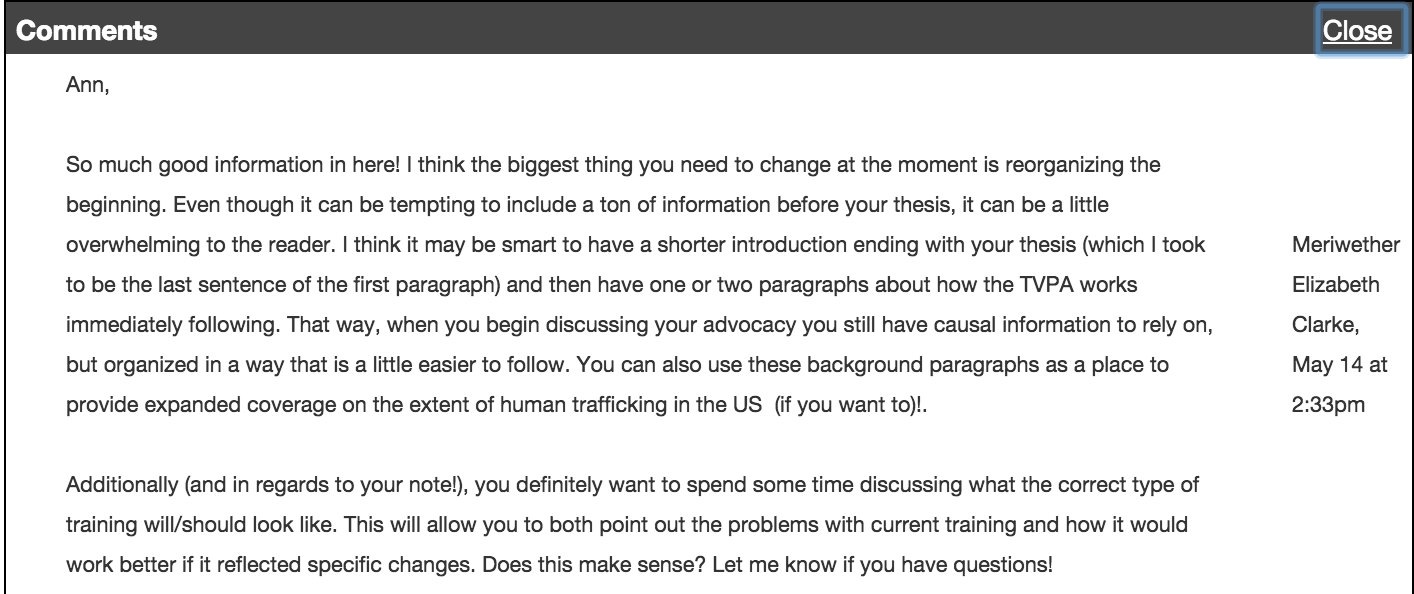
In the feedback, I was also encouraged to strengthen my advocacy by including specific details about the types of training law enforcement officers should receive. I suddenly remembered the same peer review for my previous ADP prospectus, shown below, which suggested a great point as she recommended me to see if training of law enforcement officers are implemented or if they are still in process, which led me to finally understanding that many of those existing solutions are still in need of huge improvements to be efficient, one of them being the training of law enforcement officers.
This was the other time when my light bulb illuminated as I finally created my thesis, advocating for the necessity of trainings and suggests ideally efficient training methods, which satisfies both of my previous questions. From there, I decided to narrow down my advocacy thesis, shown below, by specifically focusing on the training of law enforcement officers rather than the public.

I ended up extracting parts of my first ADP draft and placing it in my second draft to address the lack of training law enforcement officers have to increase the persuasiveness of more training. After carefully organizing my ADP, I used the inverse pizza structure, shown below, again has I narrowed from background information of human trafficking and the TVPA of 2000, to the problem of the TVPA of 2000, to why lack of training causes the problem of the TVPA 2000, to why training is important, to the solution that recommends better training of law enforcement officers, to details of the specific type of trainings that should be implemented.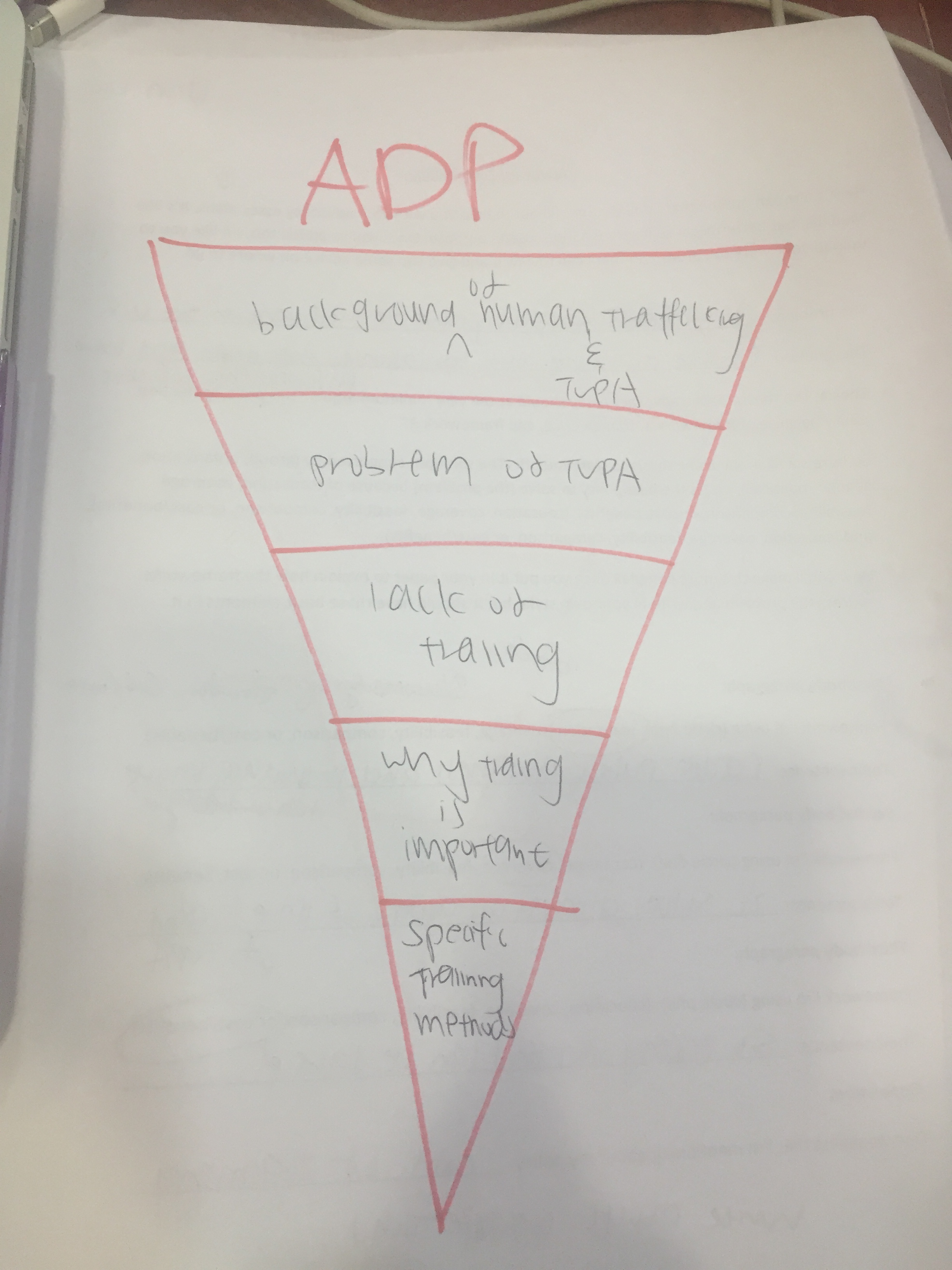
Organizing and composing my HCP and ADP was the hardest part of this course, but yet the most rewarding as it set the structure and base for me to further support my arguments with my sources.
By reorganizing my structure, my second draft received positive feedbacks, shown below, for its logical order and abundant research and was only suggested to specify my thesis more.
As suggested, I strengthened my thesis for my final draft, shown below with a comparison of my second draft and final draft thesis, by including details of how law enforcement officers should be trained from just merely stating how training is crucial.
Second Draft:

Final Draft:

After fixing that problem, I devoted the rest of my time to research and add on more information to my paper. This was one of the best parts of my researching process as I found so many instructive sources, shown below in cited in MLA format, that gave absolutely wonderful and complete information not only to strengthen my argument, but providing interesting and crucial knowledge for myself to learn.


 The information they provided were so relevant that I was very tempted to include everything in my paper, including suggesting training methods from other country and even explaining how cooperation is extremely vital in combating human trafficking as well, shown below in an excerpt from the first source shown above.
The information they provided were so relevant that I was very tempted to include everything in my paper, including suggesting training methods from other country and even explaining how cooperation is extremely vital in combating human trafficking as well, shown below in an excerpt from the first source shown above.
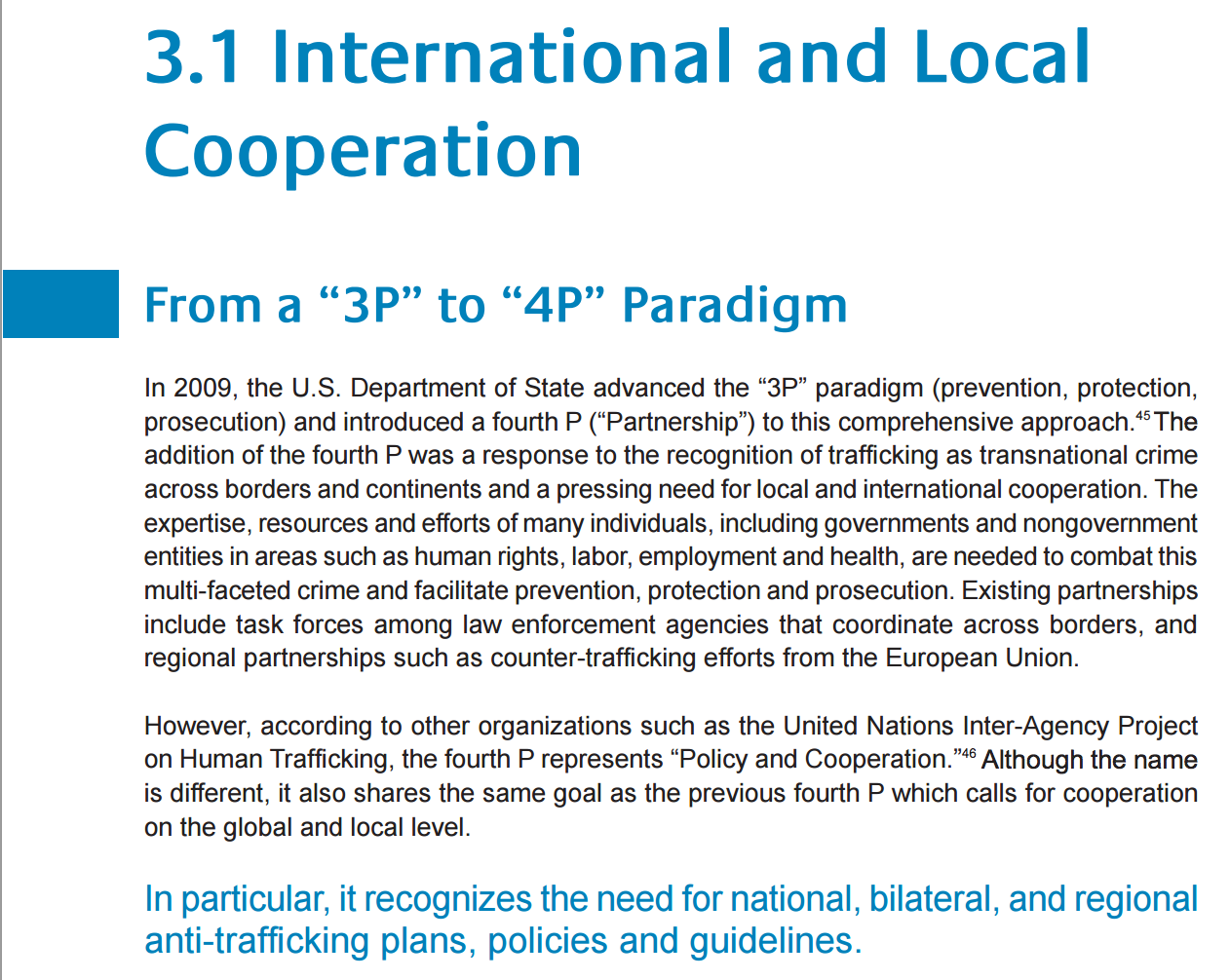 ( I greatly enjoyed reading through this source during my free time to learn more about human trafficking and would really recommend others to as well)
( I greatly enjoyed reading through this source during my free time to learn more about human trafficking and would really recommend others to as well)
However, I figured these topics would generate whole new research papers just to explain them. As a result, I sought help in office hours for whether or not I should include them by briefly mentioning them in my essay and was suggested later in the feedback, shown below, that it was not necessary since my argument was already very convincing.

The multi-modal aspect of the ADP was quite different from that of the HCP. While the HCP required them to be integrated within the paper, the ADP separated them into an individual oral and visual presentation. I viewed this as nothing but an opportunity to further strengthen my argument as I incorporated visuals that present the ineffectiveness of the TVPA 2000 and the necessity of trainings of law enforcement officers. Below shows how I contrast the number of increasing trafficking cases and number of increasing states moving up tiers, which measures how well a state comply with the TVPA, through 2011-2014 to demonstrate the ineffectiveness of the TVPA 2000.
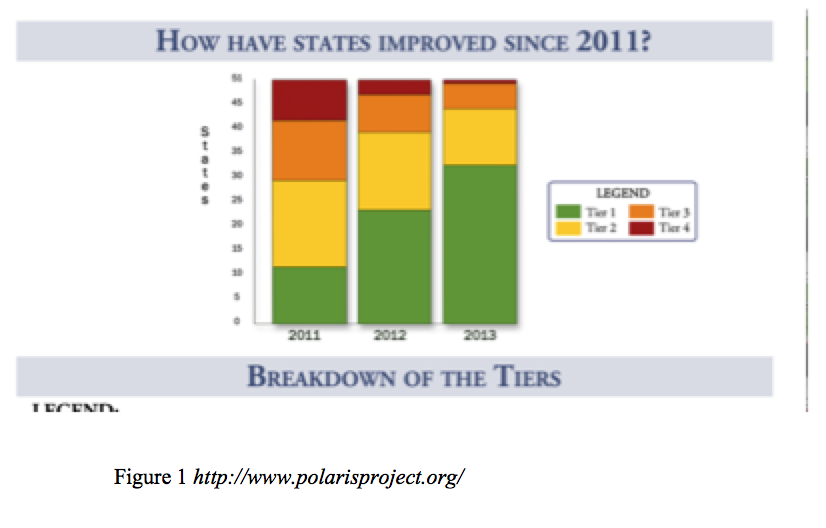
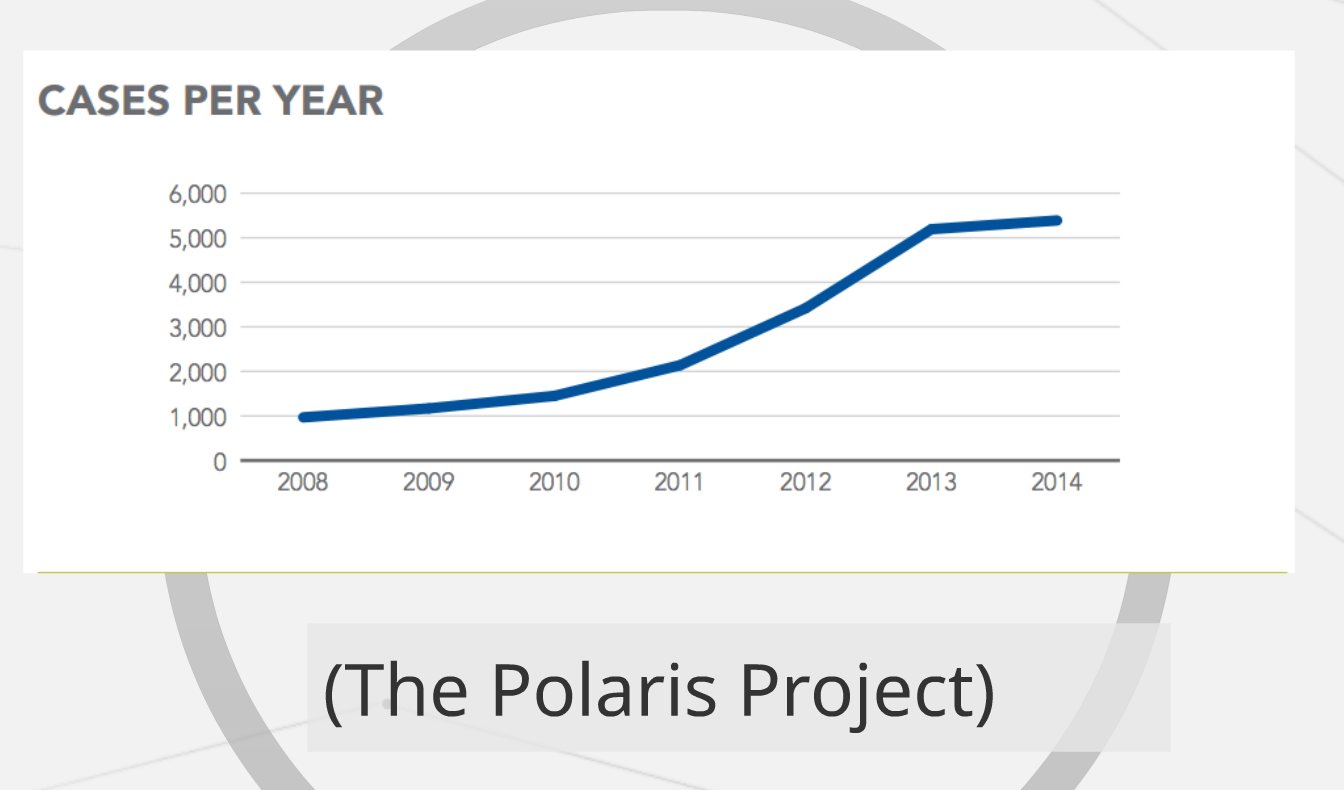
Not only in the presentation, I included images in my final draft such as samples of law enforcement training checklists and detailed statistics on law enforcement officers’ perspective shown below to further strengthen my argument.
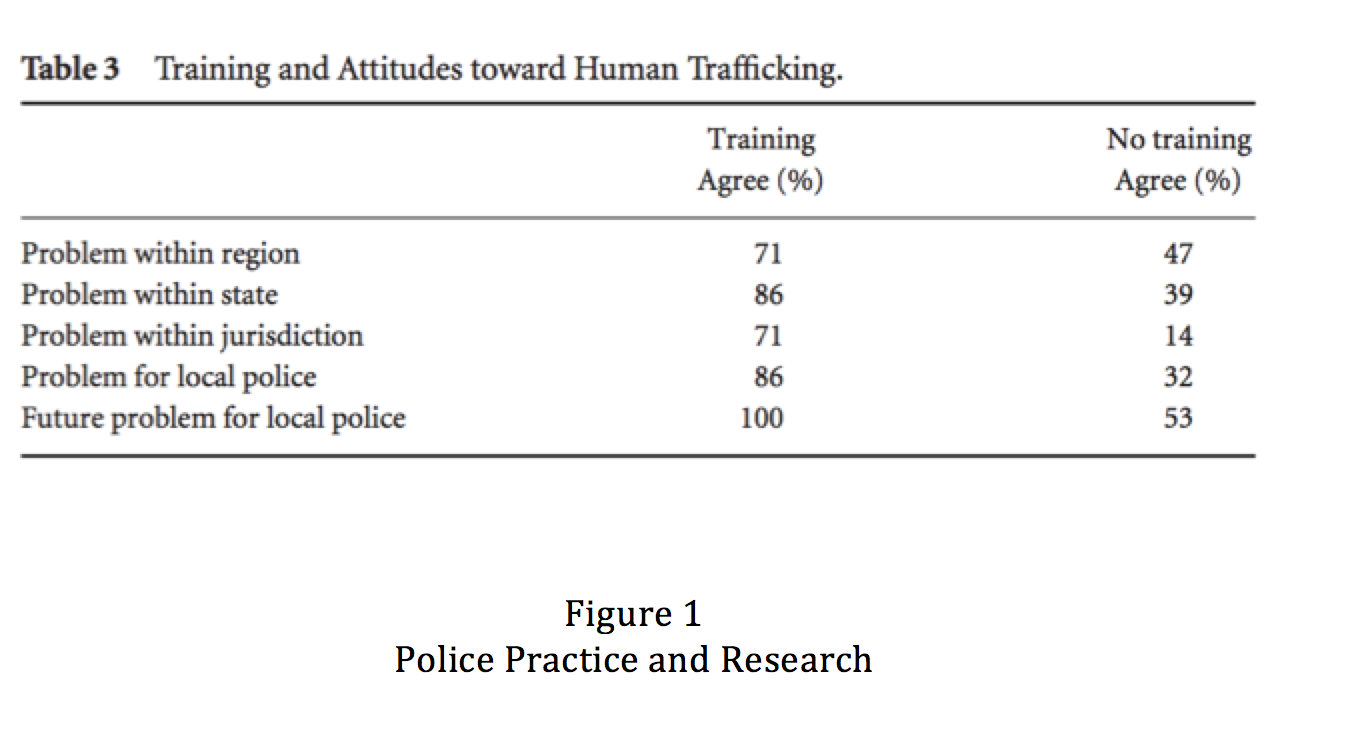
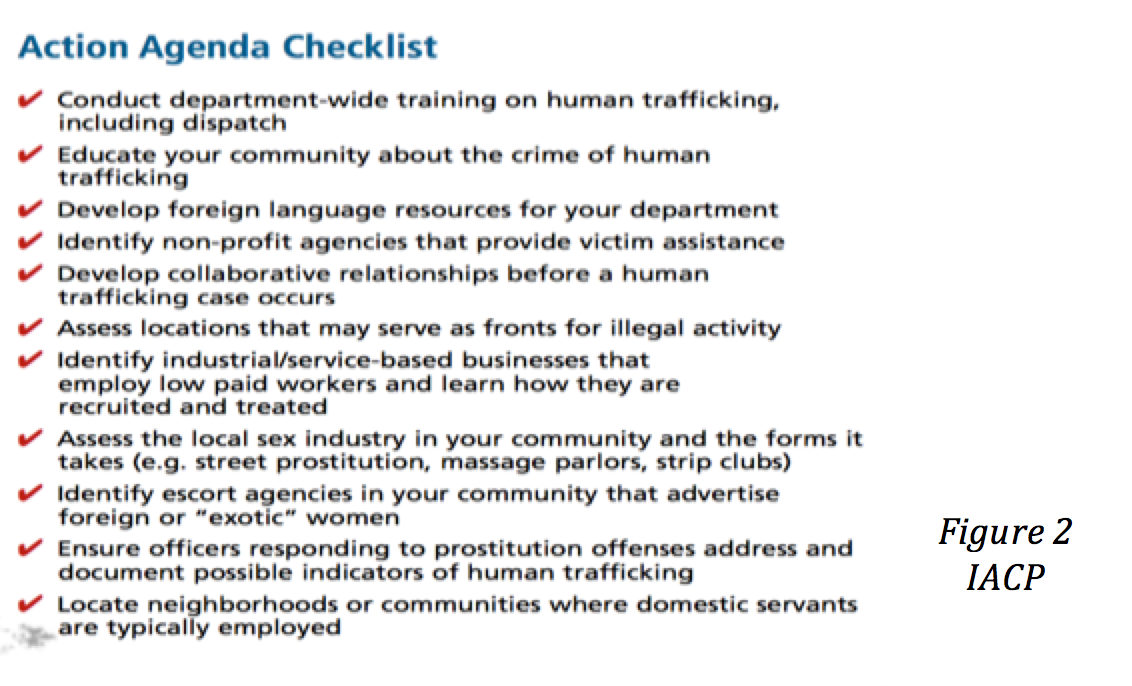
It was a great relief to submit the final draft of my advocacy project. By writing this reflective introduction, I saw the gradual improvement of my writing skills and my passion to write through intensive researching and accepting, analyzing, and adjusting the flaws of my papers through helpful feedbacks and comments. Researching has developed me into a person who processes her surrounding and perspective with deep-level thinking. Writing 39C emphasizes the quality of its research papers through strong ethos, logos and pathos, and as a result, I have not only strengthened these skills in writing, but in other classes and my general thinking has I always ensure my credibility, persuasiveness and logicality behind my arguments.
I am proud and confident when I say Writing 39C is by far the most challenging yet fulfilling and even life-changing class I have taken so far. I absolutely hated writing before taking this course, and now I am a lover of writing as I learned to powerfully express my thoughts and believe through concrete evidence and support. I am extremely lucky to have Global Woman as my class theme as I am very passionate toward this subject, but most importantly to have my professor, who was always so supportive and welcoming when I approach her for questions and informative when providing feedbacks and suggestions. I believe all the long hours I devoted toward this subject showed my passion towards this subject and will be reflected in the final grade I receive for this course. Although this course is coming to an end, I will be carrying on the essential skills and most importantly passion I developed throughout this process to utilize them in the rest of my learning experience. At last, I want to give special thanks to my supportive peers who offered me crucial feedbacks for peer reviews and my professor, Meriwether Clarke, that I was very privileged to be taught by.

 icons at the top right corner of the subsection.
icons at the top right corner of the subsection.